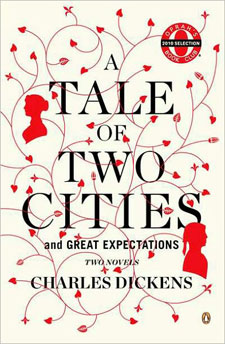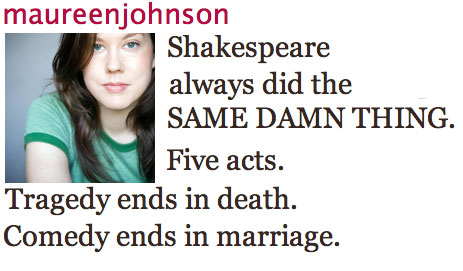Your Attacks on Genre Fiction Grow Tiresome
Basically, there are only two reasons to invoke genre when discussing literature, and both of them are about marketing. You can classify a book as belonging to a genre in order to underscore its appeal to a potential reader: If you liked this and this and this, then you may like this, for it is similar to the others. Or you can classify a book as not belonging to a genre in order to underscore its appeal to another potential reader: “Genre novels are all alike,” a book snob might tell you, “every literary novel is literary in its own way.”
No, really: That’s pretty much Edward Docx’s argument in a recent Guardian essay, only he never quite boils it down that succinctly. For him, it’s about how “even good genre… is by definition a constrained form of writing,” so “if you are following conventions, then a significant percentage of the thinking and imagining has been taken out of the exercise.” One assumes that the opposite must therefore be true of the “literary” novel, the author of which can make innovative textual decisions without any thought to convention or precedent, merrily re-inventing the very medium of the novel with each keystroke. One must assume this, because even Docx doesn’t have the audacity to actually set something that ridiculous into print.
OK, I lied at the beginning, because there’s actually a third good reason to talk about elements of genre, the discussion of typology and convention for the purposes of criticism—seriously, it’s like Docx never even cracked open a copy of Northrop Frye’s Anatomy of Criticism, for if he had, he would have been reminded that the very novel is itself a genre. (And, too, he would surely have recognized that the role of a public critic, such as he is playing for The Guardian, is not scholarly or scientific, but rather another artistic contribution to the history of taste. Much like this!)
Even the most literary literature is, at its foundations, generic. Would Docx suggest that Hamlet was easy for Shakespeare to write because so much of the thinking and imagining had been done for him beforehand?
16 December 2010 | theory |
I Want to Read Like Common People
 Now, it’s true, I have some issues with Oprah’s Book Club, specifically with the pattern of books Oprah Winfrey’s been picking for it over the last six years, and I even share the opinion of the bookish New Republic writer, Hillary Kelly, that Great Expectations and A Tale of Two Cities is an awkward pair of Dickens novels to read in tandem. (So what would I choose? Nicholas Nickleby and David Copperfield, maybe?) But that’s one of the few things I agree with in Kelly’s profoundly elitist attack on Oprah, the ruination of great literature.
Now, it’s true, I have some issues with Oprah’s Book Club, specifically with the pattern of books Oprah Winfrey’s been picking for it over the last six years, and I even share the opinion of the bookish New Republic writer, Hillary Kelly, that Great Expectations and A Tale of Two Cities is an awkward pair of Dickens novels to read in tandem. (So what would I choose? Nicholas Nickleby and David Copperfield, maybe?) But that’s one of the few things I agree with in Kelly’s profoundly elitist attack on Oprah, the ruination of great literature.
Kelly’s article comes across as one lone note of resentment that Oprah Winfrey, rather than the official gatekeepers of the literary canon, is convincing people to read Dickens and Tolstoy—of course, if Oprah’s making the recommendation rather than, oh, I don’t know, Harold Bloom, it stands to reason that she must be encouraging us to read these books for the wrong reasons. Seriously: Kelly says the Book Club’s selections stem from “a generally wrongheaded view of novels,” one through which “the Book Club has carved its niche among readers by telling them that the novel is a chance to learn more about themselves. It’s not about literature or writing; it’s about looking into a mirror and deciding what type of person you are, and how you can be better.” So, you see, I’m not just invoking Bloom off the top of my head:
“If we read the Western Canon in order to form our social, political, or personal moral values, I firmly believe we will become monsters of selfishness and exploitation. To read in the service of any ideology is not, in my judgment, to read at all. The reception of aesthetic power enables us to learn how to talk to ourselves and how to endure ourselves. The true use of Shakespeare or of Cervantes, of Homer or of Dante, of Chaucer or of Rabelais, is to augment one’s own growing inner self. Reading deeply in the Canon will not make one a better or a worse person, a more useful or more harmful citizen. The mind’s dialogue with itself is not primarily a social reality. All that the Western Canon can bring one is the proper use of one’s own solitude, that solitude whose final form is one’s confrontation with one’s own mortality.”
(And Bloom wrote The Western Canon well before Winfrey had made her first Book Club selection!)
15 December 2010 | theory |


 Our Endless and Proper Work is my new book with Belt Publishing about starting (and sticking to) a productive writing practice.
Our Endless and Proper Work is my new book with Belt Publishing about starting (and sticking to) a productive writing practice. 
